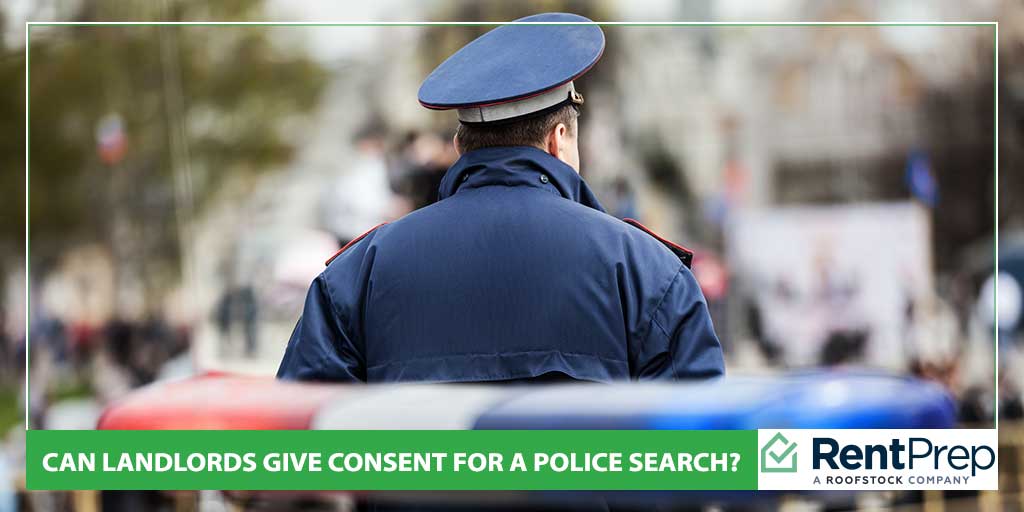
Most landlords struggle with the concept that while they are owners and managers of a rental property, they give up certain rights to that property when it is occupied by a tenant. Examples of this might include feeling like they can enter the property without giving written notice, change the locks at any time, or otherwise invade the tenant’s privacy.
Smart landlords have educated themselves on when it is appropriate for them to legally access the rental property and when they are not allowed to.
However, many landlords don’t think about what to do if they are asked by the police to access the rental property. Before it actually happens, it’s a good idea for landlords to know their rights and the rights of their tenants, and find out whether or not landlords alone can allow the police into a rental property while it is occupied.
Can a landlord allow police to search a rental?

There are many reasons why the police might want to search a rental property. They could be hunting down a suspect or known criminal, looking for drugs, acting on a tip, following a lead or conducting an investigation.
However, the police can’t just go into someone’s home whenever they want, whether it is a rental property or one owned by the occupant. The law protects people of all backgrounds and living situations from unnecessary searches by the police without a search warrant that is signed by a judge.
Whether or not the landlord has given permission to the police matters little. The warrant is what matters most.
There are only three ways that it is legal for the police to enter a rental property to conduct a search:
- The police can enter a property and conduct a search without a warrant if the current tenant gives consent to do so.
- They are also allowed to enter a property without permission from the tenant if they have a proper search warrant signed by a judge.
- Police can enter a rental property if they believe there is an imminent danger, such as hearing shots fired from inside, sounds of serious fighting or answering calls for help.
Based on these three scenarios the police cannot enter your apartment without a warrant unless the tenant has given permission.
The tricky part for landlords is determining what part they play in granting consent, or allowing police access to a rental property if they show up with a search warrant.
Knowing what they must do in either scenario is important for landlords to know.
Basically, a landlord cannot give consent to the police to search an occupied rental property. Only a tenant listed on the lease agreement can do that. If the police have a proper search warrant, then the landlord is obligated to allow them to enter the rental property, even if the tenant is not there.
Can landlords search your apartment?
The answer to this question all depends on what state you live in. Nolo.com has put together a good resource on this. Attached below is a screenshot from their site highlighting each state and the laws landlords must follow before conducting a search on your apartment.

But what about a landlord’s right to enter a rental property due to an emergency? The law is clear that tenants in a rental property have a right to privacy, and that is clearly set out with regards to how a landlord can access a rental property, how often, and for what purpose.
Every state with the exception of Arkansas either has no statute or allows landlords to enter for an emergency.
Landlords must inform a resident by written notice that they will be entering the rental property to do maintenance. They are also allowed by law to enter the apartment in an emergency. Many landlords might justify allowing the police access to the property as an emergency.
However, the law does not consider a request by the police to enter a resident’s rental property without a search warrant as an emergency?
The courts have consistently ruled that a landlord emergency would generally be due to a water leak, gas leak, fire or other crisis that would cause damage to the property if it is not addressed immediately. A request by the police to search a rental property does not fit the criteria of an emergency, so landlords should never allow them access. Without a search warrant, it would be against the law for a landlord to allow access to an occupied property.
The Roommate Loophole
While a landlord cannot give consent to the police to search a rental property, another occupant of the rental property, such as a spouse or roommate, can provide proper consent and allow the police to enter. If the roommate gives permission for the search, the police can check out common areas, like the living room or bathroom.
However, they cannot search private areas, such as a tenant’s bedroom, without that tenant’s permission. Unless the police have a search warrant, any private areas are off limits to a search.
There are plenty of legal ways for landlords to gain access to a rental property, and there is also a legal way for the police to conduct a search of a rental property.
Before it is too late, landlords need to know that it is actually violating the law to cooperate with the police by providing them entry to an occupied rental property without the tenant’s consent, unless they have a search warrant.

